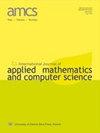欧拉-拉格朗日系统的一种有效容错控制方案
IF 1.2
4区 计算机科学
Q3 AUTOMATION & CONTROL SYSTEMS
International Journal of Applied Mathematics and Computer Science
Pub Date : 2023-06-01
DOI:10.34768/amcs-2023-0017
引用次数: 0
摘要
每个闭环系统都有一定程度的容错能力,可通过容错控制(FTC)方案来提高容错能力。本文针对一类非线性系统(欧拉-拉格朗日系统),提出了一种有效的FTC方案,保证了故障系统的高性能和稳定性。该方案采用内环为闭环系统,外环为FTC的级联控制结构,采用基于广义比例积分(GPI)观测器的控制器来管理容错水平增量。该方案的一个重要问题是基于GPI观测器的控制器联合估计干扰和故障,提供有关系统健康状态的信息,然后补偿它们的影响。该方案设计时只需要惯量矩阵,既能保持标称控制律不变,又能在不需要系统故障(故障诊断模块)的显式信息的情况下正常运行。在摆模型上的仿真结果表明了所提出的跟踪控制方案的有效性。本文章由计算机程序翻译,如有差异,请以英文原文为准。
An Efficient Fault Tolerant Control Scheme for Euler–Lagrange Systems
Abstract Every closed-loop system holds a level of fault tolerance, which could be increased by using a fault tolerant control (FTC) scheme. In this paper, an efficient FTC scheme for a class of nonlinear systems (Euler–Lagrange ones) is proposed, which guarantees high performance and stability in a faulty system. This scheme was designed on the basis of a cascade control structure in which the inner loop is the closed-loop system and the external loop is the FTC, a generalized proportional integral (GPI) observer-based controller, which manages the fault tolerance level increment. An important issue of the proposed scheme is that the GPI observer-based controller jointly estimates disturbances and faults, providing information about the state of health of the system, and then compensates their effect. The scheme is efficient because only the inertia matrix is required for the controller design, it is able to preserve the nominal control law unchanged and can operate properly without explicit information about system faults (fault diagnostic module). Simulation results, on a pendulum model, show the effectiveness of the proposed scheme for tracking control.
求助全文
通过发布文献求助,成功后即可免费获取论文全文。
去求助
来源期刊
CiteScore
4.10
自引率
21.10%
发文量
0
审稿时长
4.2 months
期刊介绍:
The International Journal of Applied Mathematics and Computer Science is a quarterly published in Poland since 1991 by the University of Zielona Góra in partnership with De Gruyter Poland (Sciendo) and Lubuskie Scientific Society, under the auspices of the Committee on Automatic Control and Robotics of the Polish Academy of Sciences.
The journal strives to meet the demand for the presentation of interdisciplinary research in various fields related to control theory, applied mathematics, scientific computing and computer science. In particular, it publishes high quality original research results in the following areas:
-modern control theory and practice-
artificial intelligence methods and their applications-
applied mathematics and mathematical optimisation techniques-
mathematical methods in engineering, computer science, and biology.

 求助内容:
求助内容: 应助结果提醒方式:
应助结果提醒方式:


